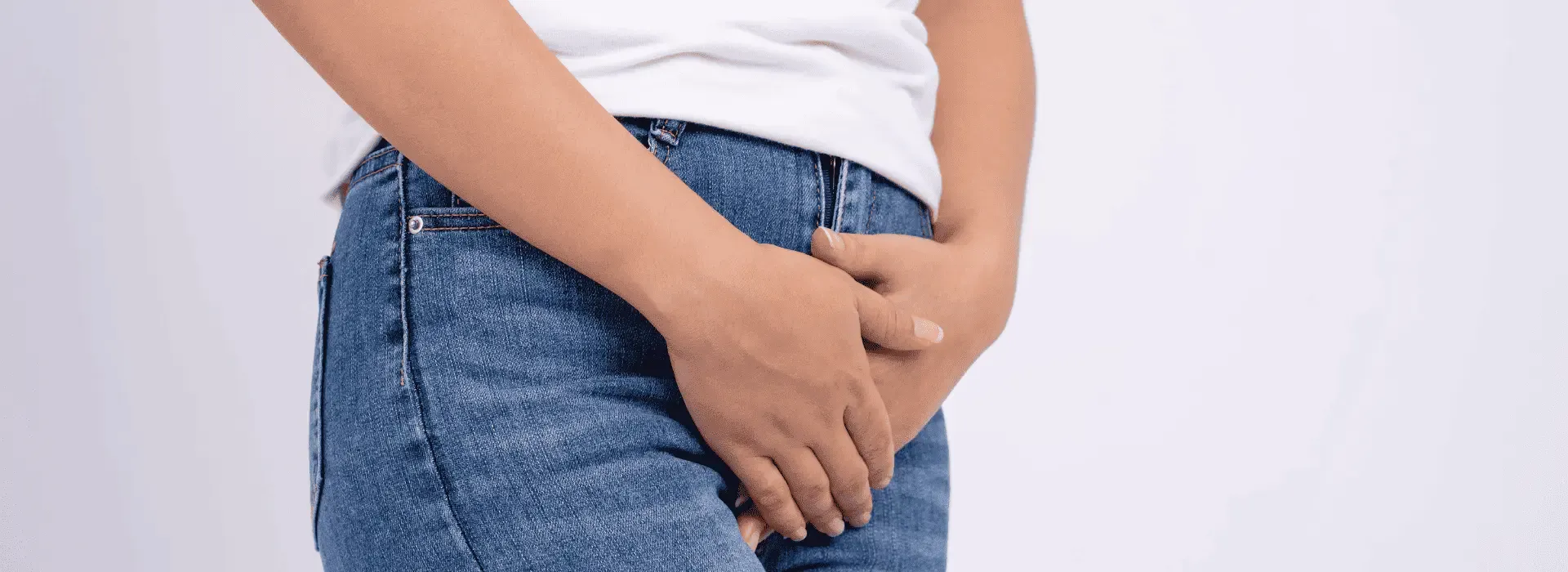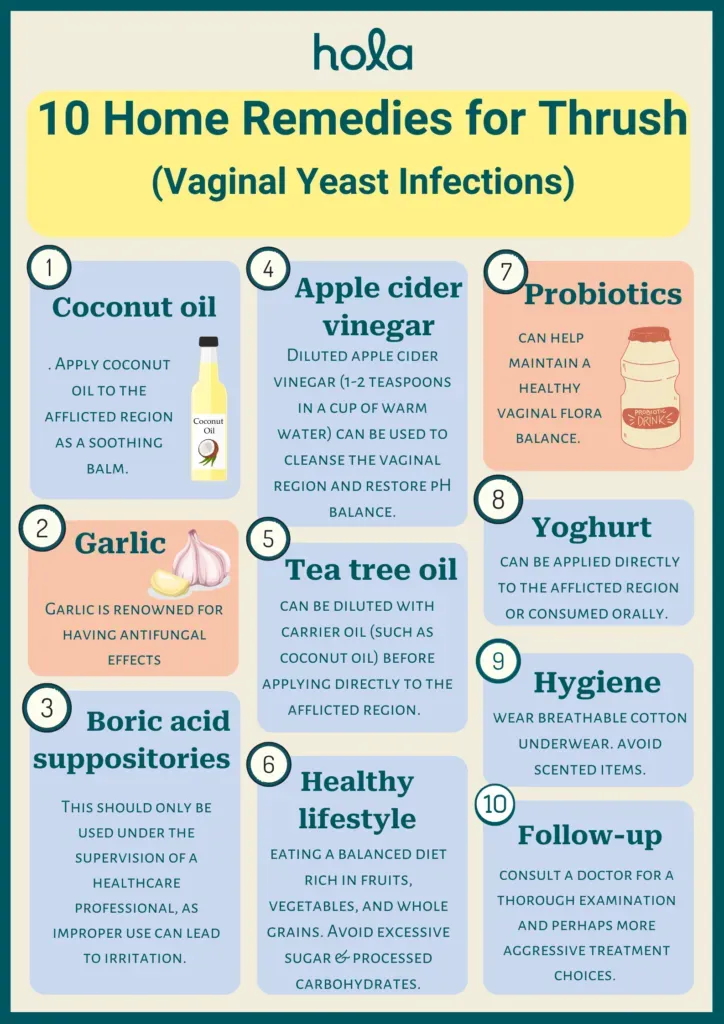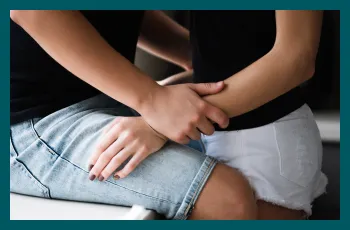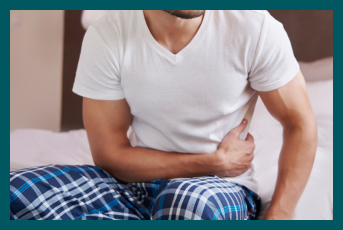Home Remedies for Thrush (Vaginal Yeast Infections)
Written by the editorial staff writer at Hola. Medically Reviewed by Dr Nelson Lau, MBBS FRACGP, GP & Digital Health Specialist. Originally published on 25 March 2025. Blog updated on 31 August, 2025.

Contents

Overview
Vaginal thrush, also known as vaginal yeast infection or candidiasis, is a common fungal infection of the vagina. It is caused by an overgrowth of Candida albicans, a yeast species that normally exists in the vagina in small quantities. When the natural balance of microorganisms in the vagina is disrupted, Candida can multiply excessively, leading to symptoms like itching, irritation, burning, and abnormal vaginal discharge. About 5–8% of women of reproductive age experience recurrent vulvovaginal candidiasis, defined as four or more episodes in 12 months1. While serious and recurring cases may necessitate medical treatment, effective home remedies can help relieve symptoms and support recovery.Symptoms of vaginal thrush
Common symptoms include:- Intense itching and burning around the vagina or vulva
- A thick, creamy, cottage cheese-like white discharge (usually odourless)
- A stinging sensation while urinating
- Redness, swelling, and irritation of the vagina
- Splits or cracks in the genital skin
- Pain or discomfort during sex
Causes and risk factors
Several factors can lead to the overgrowth of Candida, including:- Antibiotic use (kills healthy vaginal bacteria)
- Pregnancy
- Oral contraceptive use
- General health conditions such as immune system disorders, iron deficiency, or diabetes
- Changes in the menstrual cycle
- Tight or synthetic clothing, which traps moisture
- Use of scented soaps or bubble baths
- Vulval skin conditions such as eczema or psoriasis
- Use of immunosuppressive medications
- High-sugar diets, which promote yeast growth
Experiencing these symptoms? Speak with a doctor within 15 minutes.
See a Doctor now
Available 24/7, across Australia.
Home remedies for thrush
 Home remedies may support medical treatments, especially for mild or recurrent cases. The following remedies are categorised by strength of evidence and safety considerations.
Home remedies may support medical treatments, especially for mild or recurrent cases. The following remedies are categorised by strength of evidence and safety considerations.
Evidence-supported remedies:
These remedies are backed by scientific evidence and are generally considered safe.- Probiotics and yogurt:
- Plain, unsweetened yogurt can help restore healthy bacteria in the vaginal area. It can be consumed orally or gently applied directly to the affected area.
- Probiotic supplements containing Lactobacillus acidophilus may promote vaginal health.
Good hygiene:
- Wear breathable cotton underwear and loose clothes.
- Avoid using perfumed soaps, douches, and bubble baths.
- Keep the vaginal area dry; remove wet garments promptly.
- Practice front-to-back wiping after using the toilet.
Low-sugar diet:
- Reducing sugar and refined carbohydrates2 can help manage yeast overgrowth, particularly for those experiencing recurrent thrush.
Complementary remedies (limited evidence):
These remedies appear beneficial, but strong scientific validation is lacking. They should be used with caution, and vaginal application should be avoided unless recommended by a doctor.Coconut oil:
- It has natural antifungal properties.
- It can be applied externally to alleviate local irritation.
Tea tree oil:
- Lab tests suggest it can help fight yeast growth.
- It must be mixed with a base oil and used externally, not inside.
Oregano oil:
- Contains carvacrol and thymol, natural compounds with yeast-inhibiting properties.
- Should be applied externally in diluted form only; not recommended for internal use.
Aloe vera gel:
- Aloe vera has natural anti-inflammatory properties; it may help relieve irritation on the skin’s surface.
Hydrogen peroxide baths:
- Diluted use in a sitz bath may help slow down yeast growth.
- Not suitable for douching or direct, undiluted application.
Vitamin C and E:
- Oral intake may support immune function.
- Vitamin E capsules used in the vagina may calm irritation, but they should be used with medical advice.
Fermented foods:
- Kefir, kombucha, and sauerkraut can promote gut bacteria health, which may also help support vaginal health.
Not recommended without medical advice:
These home remedies are popular, but they can occasionally cause irritation, pose risks, or be ineffective. Always check with your doctor first.- Garlic insertion: Garlic contains natural compounds that can fight fungus. However, intravaginal use may cause pain, irritation, or even injury.
- Apple cider vinegar: It may help balance pH in theory, but applying it undiluted can cause irritation and aggravate discomfort.
- Boric acid suppositories: Used in cases of recurrent or stubborn thrush under specialist guidance. Dangerous if swallowed and isn’t safe in pregnancy.
Over-the-counter treatment in Australia
Mild cases of thrush may be managed with antifungal creams or vaginal tablets (passaries), such as:- Clotrimazole
- Miconazole
- Fluconazole (oral capsule)
When to see a doctor
Most episodes of vaginal candidiasis are mild and can be managed with over-the-counter treatments or simple lifestyle measures. However, medical advice is important if:- It’s your first vaginal infection- to confirm that your symptoms are due to thrush and not another condition (bacterial vaginosis or a sexually transmitted disease).
- You’re pregnant or breastfeeding- some antifungal medicines may not be safe, and your doctor can recommend the best option.
- You experience recurrent infections- having thrush four or more times a year may indicate an underlying health condition that needs assessment.
- Your symptoms are severe- including intense pain, swelling, cracking of the skin, or open sores.
- Treatment hasn’t worked- if your symptoms persist despite using antifungal creams or tablets, you may need a different medicine or further testing & thrush treatment.
- You notice unusual symptoms- such as lower abdominal pain, fever, a strong odour, or abnormal vaginal bleeding, which could point to a different infection or gynaecological issue.
How Hola Health help
At Hola Health, we make it simple and discreet to access the right care for vaginal thrush in Australia. Our Australian-registered doctors can:- Provide personalised advice through telehealth appointments with qualified GPs and health practitioners to help confirm whether your symptoms are due to thrush or another vaginal condition.
- Issue online prescriptions for antifungal treatments as appropriate.
- Offer treatment plans if you experience recurrent thrush (4 or more episodes per year).
- Arrange GP referrals online to a gynaecologist or other specialists if your symptoms are severe, persistent, or unusual.
- Send medical certificates online for thrush symptoms that are affecting your ability to work or study.
Conclusion
Thrush can be bothersome, but natural remedies can ease the way to recovery. With consistent care, good hygiene, and the right support, your body can restore its balance. Stay patient and committed; recovery is on its way. Running low on meds? Get an online script from home in minutes.
Request an instant script
Available 24/7, across Australia.
Reference
- Vaginal thrush - reference link
- RACGP - reference link
What we treat
- Cough
- Nausea & vomiting
- Fever
- Hayfever
- Fatigue
- Sore throat
- Acne
- Hair loss
- Gout
- Eczema
- Rosacea
- Sunburn
- UTI
- Erectile dysfunction
- Contraception
- Morning sickness
- Morning after pill
- Prostate health
- Anxiety
- Depression
- Stress
- Grief & loss
- Antidepressants
- Premature ejaculation
- Asthma
- Blood pressure
- Blood thinners
- Diabetes
- Cholesterol
- Migraines & headaches
- Allergies
- Body ache
- Heartburn & reflux
- Sleep disorder
- Pain relief
- Gastro
Related Articles
Disclaimer
This blog is for general informational purposes only and does not indicate that Hola Health provides all treatments or preventive measures mentioned. It is not intended to be a substitute for professional medical advice. Always seek the guidance of your doctor or other qualified health professional with any questions you may have regarding your health or a medical condition. For emergencies please immediately contact 000. Any medical topics discussed are intended to educate, not to imply availability through Hola Health.
 Facebook
Facebook  X
X  Copy Link
Copy Link



